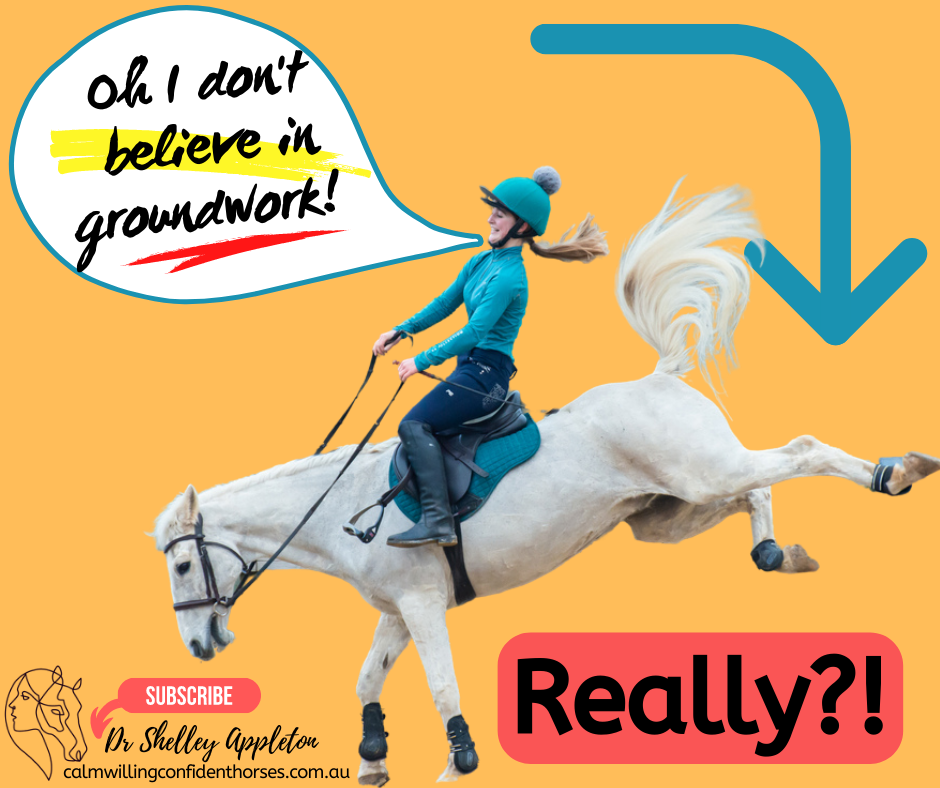“I don’t believe in groundwork” - really?!
“I Don’t Believe In Groundwork”
Really?
Do you believe in sending five year old kids off to high school as well? How about not bothering with paddle pools or the shallow end of swimming pools and just chucking little kids straight in the deep end to do laps?
Not believing in groundwork for a horse is like not believing teaching kids the alphabet is important for them when they are learning to read. Or developing the ability to float on their backs, blow bubbles and paddle in low levels of water is important in developing confidence in the water.
Teaching a horse to work on the ground minus a rider, saddle or bridle, is part of a process of preparation that establishes a starting point that eventually leads to the horse being calm, willing and confident under saddle.
When people say “I don’t believe in groundwork”, that is just code for….“I have never been exposed to good groundwork” …or “I have no idea why it matters” …or “I tried it once but struggled to learn how to do it, I felt like a failure and never want to feel like that again”!
Also, people can think that if a hose is already broken in then it should only need to be ridden. This is a misconception because groundwork can be the most effective and thoughtful way of helping a horse at any stage of its life. This is because a horse can quickly lose its confidence being ridden and trust in those who are riding it. This can be due to a bad experience, confusion, pain, injury or just a change in rider or home.
Going back to groundwork and rebuilding the horse’s foundation can help heal confusion, solve behaviour problems and re-establish trust and confidence in your partnership.
However, ignorance about groundwork has people believe they don’t have to find this starting point, this venturing backwards into the horse’s foundation. Instead they want to start where THEY want to fix it - in the saddle!
Unfortunately this doesn’t consider the horse and their perspective on the matter. It is the kid who is struggling to read Shakespeare that just gets a new Shakespeare play to read when they actually struggle to spell. It is the kid made to keep swimming laps when they haven’t developed a proper breathing technique and it just trying to swim whilst holding their breath. To help horses you have to go and find the gap, the glitch, the trigger the struggle etc. The “why” to what they don’t understand or what they feel uncomfortable about and start BELOW that. Needless to say things typically go pear shaped and the horse just gets labelled a “problem” horse that is “difficult” or worse - “naughty”. Which is ironic as the problem is the people are making it too difficult for the the horse to feel better, learn and grow in confidence!
Now I know what some of you are thinking right now…but groundwork is just for “people that are too scared to ride”…well this can be true and a discussion for another blog…but that doesn’t mean groundwork done for the clear purpose is not beneficial for horses and an important skill set to learn.
There are many approaches and methods labelled as groundwork. Find a good teacher, work through the discomfort of being clumsy to being with. It is a skill set that needs to be practiced to developing timing and feel in groundwork, no different than you had to learn how to ride. However, time and patience will allow you to develop a skill set that you can draw on at any time to help a horse be at the place IT needs to be. Whether that is learning to jump, getting confidence with new environments, getting confident with water, building confidence in canter, overcoming injury, forming a new partnership with a new rider, or just restoring trust and confidence after an incident.
Groundwork helps horses and is sometimes the place you need to return to and that is not a “belief” that is a “fact”!
